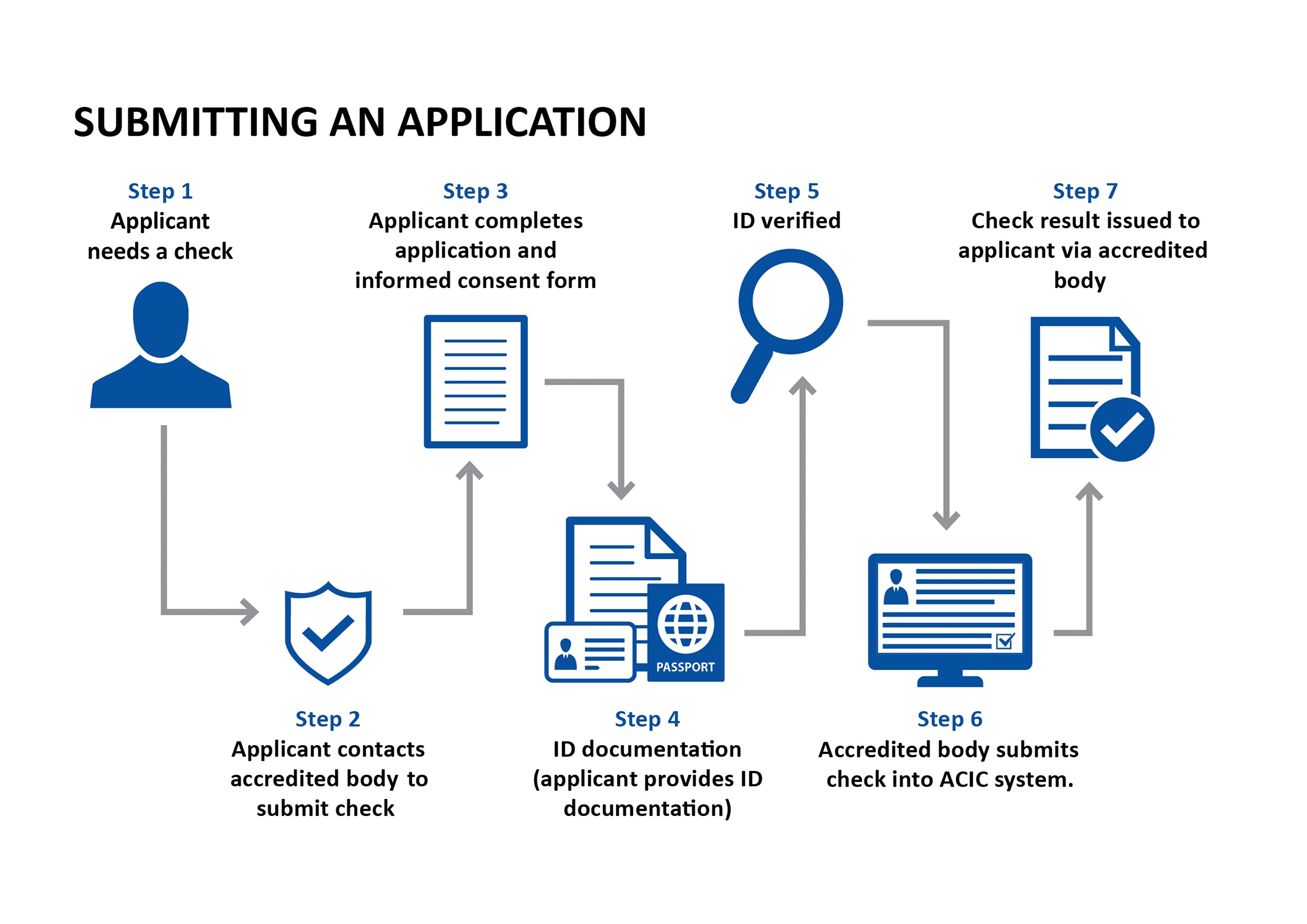Australian nationally accepted police checks are administered by the Australian Criminal Intelligence Commission (ACIC) and can be known as Nationally Coordinated Criminal History Checks, or police checks. Police checks are often required when applying for employment, or appointment to positions of trust and can be obtained in person from the Police, or online via an Accredited Provider such as CV Screen.
What is a Police Check?
What is a Nationally Accepted Police Check?
When is a Police Check Required?
There are many scenarios where a nationally accepted police check may be required. Most commonly, police check are obtained as part of the pre-employment screening process, assisting organisations to make informed decisions about the suitability of applicants for:
- Recruitment, job applications and pre-employment screening
- Volunteer and not-for-profit positions
- Working with children or vulnerable people
- Adoption applications
- Occupation related licensing
- Firearm licensing.
Identity Verification Requirements
Identity documentation is required for identity verification purposes when applying for a nationally accepted police check. The documents are required to ensure linkage between you and your claimed identity. Four documents need to be provided from the following three categories:
One (1) Commencement of ID Document
- Australian birth certificate
- Australian passport
- Australian visa
- ImmiCard
- Australian Citizenship Certificate
One (1) Primary Use in Community Document
- Australian drivers licence
- Australian marriage certificate
- Overseas passport
- Proof of age or photo identity card issued by Australian government
- Current shooters or firearms licence
- Student ID Card (if under 18)
Two (2) Secondary Use in Community Documents
- Medicare card
- Student ID
- Bank or credit card
- Australian Private Health Insurance Card
- Australian Trade Association card

How is a Nationally Accepted Police Check Processed?
Step 1—Applicant submits police check
The applicant submits an online application for a police check with CV Screen.
Step 2— CV Screen lodges the application
Once CV Screen verifies the applicant’s identity, the applicant’s personal details are submitted into the National Police Checking Service Support System (NSS), the national IT system owned and operated by the ACIC.
Step 3—Applicant’s details are searched against national records
The applicant’s personal details are checked against a national database using a name matching algorithm. If the personal details match any police information held in police records, the system will generate a ‘potential match’.
Step 4—Potential match referred to police (Matching)
If the system generates a potential match, it will be referred to the relevant police agency (or agencies) for further assessment.
If the police agency confirms the applicant’s details do not match the police information, a ‘No Disclosable Court Outcome’ result will be provided to the accredited body or police agency that submitted the police check.
If the police agency determines the applicant’s details do match the police information, a referral is generated with the relevant police agency for them to conduct their ‘vetting’ process.
Step 5—Police apply spent conviction legislation and/or information release policies (Vetting)
When an applicant’s personal details match the police information held in police records, the police agencies will determine what information can be released in accordance with the purpose of the check and the relevant spent convictions legislation and/or information release policies. This is commonly referred to as ‘vetting”.
Step 6— Police check result is released
Once the police have finished processing the police check, CV Screen retrieves the police check result and notifies the applicant that the result is available for download.
More Information on Police Checks?
The applicant needs to provide personal information and supporting documentation to prove their identity. It is important to provide as much information as possible to ensure the Police Check is processed accurately and in a timely manner.
The applicant must also provide informed consent. As an accredited body, it is the responsibility of CV Screen to establish a verifiable link between the identity documents and the individual.
The purpose of your police check will show on the results of your police check result. Enter a maximum of 100 characters into each of the purpose fields of your police check. Examples of a purpose include:
- Cleaner working in private homes
- Admin staff working at a hospital
- Student placement working at a school
- Truck driver delivering packages
A police check can only be conducted with the consent of the applicant. Applicants must:
- Read and understand how their personal information and related police information will be handled and disclosed
- Permit CV Screen to submit a police check on their behalf
- If applicable, permit their potential employer to use their police check result to assess their suitability for employment.
An applicant must provide their informed consent when completing an application for a police check. In doing so, they are consenting to the specific purpose of a police check.
If the applicant requires a police check for a different purpose, they must provide their informed consent again.
Volunteer checks cannot be used unless the individual applicant will:
• freely hold the position or perform the role on a voluntary basis for the benefit of the community;
• not be an employee, contractor, subcontractor, staff member or officer of an organisation; and
• not be entitled to a salary or any other entitlements or benefits associated with the position or role; or
• be a student undertaking a compulsory vocational placement as a requirement of an Australian-based academic institution or training course.
CV Screen, police agencies and the ACIC work together to deliver the Service, aiming to turnaround police checks within 24-hours, noting that:
- Around 70 per cent of police checks are completed in real-time with results being returned within minutes
- Around 30 per cent of police check are referred to one or more police agencies because a ‘potential match’ is found. On limited occasions, this process can take longer than 10 business days to process, due to the complexity of the check.
A ‘potential match’ may be found if the applicant shares similar details with other individuals recorded in police systems, particularly if they have a common name. Processing of a police check in these instances can take longer to progress.
The results provided on a police check will outline whether the applicant has No Disclosable Court Outcomes (NDCO) or Disclosable Court Outcomes (DCO):
- NDCO means there is:
- No police information held against the applicant
- No police information that can be released according to the purpose and category of the police check, and the application of relevant spent convictions legislations and/or information release policies.
- DCO means there is:
- Police information that can be released.
A police check result with a DCO may list the following police information:
- Charges
- Court convictions, including penalties and sentences
- Findings of guilt with no conviction
- Court appearances
- Good behaviour bonds or other court orders
- Matters awaiting court hearing
- Warrants and/or warnings
- Traffic offences.
The following people may have access to an applicant’s personal information and police check result:
- Authorised police staff involved in the police check assessment process
- Authorised ACIC staff to support accredited bodies and police agencies when processing the police check
- Authorised staff of CV Screen that requests the police check and receives the result
- Accredited body’s customer organisations (Legal Entity Customers)
- Third-party organisations, with the applicant’s informed consent, identified on the application form, or through relevant legislation.
CV Screen welcomes any feedback about all aspects of our business. If a complaint is received, we will keep a record of it and respond within three business days with an outcome, or next steps required to achieve an outcome.
We accept and escalate any dispute about the result of a nationally coordinated criminal history check which it receives from you, using a dispute form. The Australian Criminal Intelligence Commission provides a dispute form that must be used if you dispute a nationally coordinated criminal history check. We will lodge your dispute form directly with the Australian Criminal Intelligence Commission for further investigation.
The relevant police agencies responsible will investigate the dispute to determine an appropriate outcome. CV Screen will contact you if the relevant police agencies require further from you to support their investigation.
Once an outcome of the dispute has been determined, we will be advised whether the dispute was either:
- Successful dispute outcome – resulting in a new and amended police check, or;
- Unsuccessful dispute outcome – the result will remain unchanged.
Unsuccessful dispute outcomes can be challenged, and further documentation may be required to substantiate the challenge.
If you have any complaints about how we collect, use, disclose, store, secure and dispose of your Personal Information, including any breaches or our policies, please send an email to: contact@cvscreen.com.au
If you are not satisfied with the result of any complaints, you can escalate the matter through the Office of the Australian Information Commissioner (http://www.oaic.gov.au).
